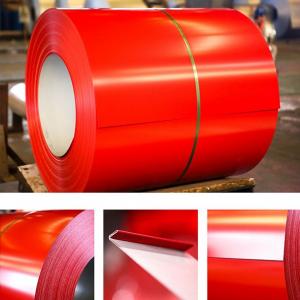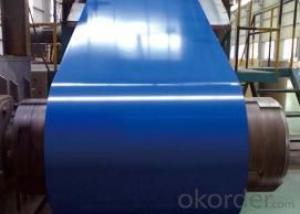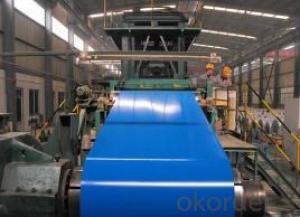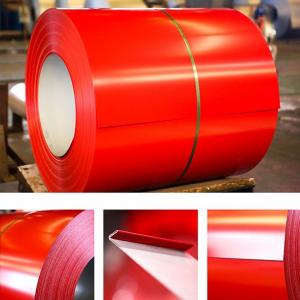Color Coated Alu-zinc Steel Coil PPGP PRE-PAINTED Aluzinc
- Loading Port:
- Shanghai
- Payment Terms:
- TT or LC
- Min Order Qty:
- 20 m.t.
- Supply Capability:
- 10000 m.t./month
OKorder Service Pledge
Quality Product, Order Online Tracking, Timely Delivery
OKorder Financial Service
Credit Rating, Credit Services, Credit Purchasing
You Might Also Like
With Aluzinc as base metal, after pretreatment (degrease and chemical treatment) and liquid dope with several layers od color, then after firing and cooling, finally the plate steel is called pre-painted aluzinc steel.
Pre-painted aluzinc steel is good capable of decoration, molding, corrosion resistance.
It generally displays superior workability, durability and weather resistance
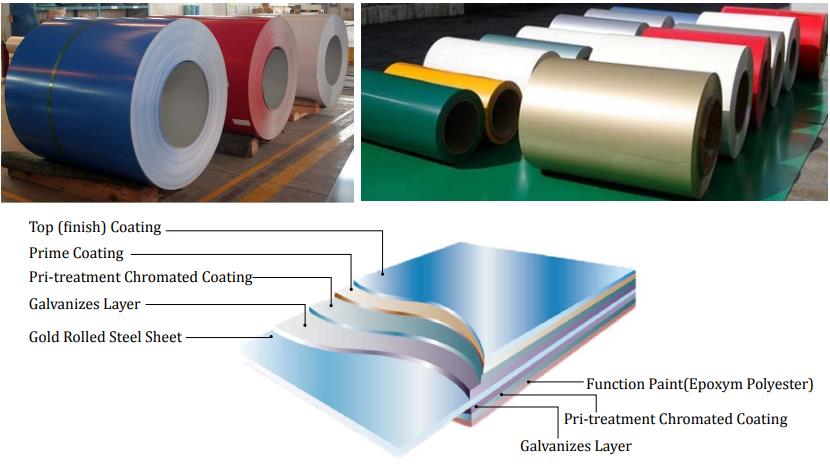
AVAILABLE SPECIFICATION
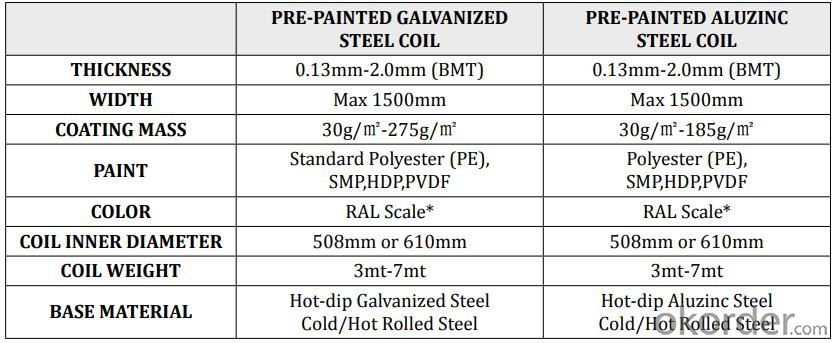
STANDARD & GRADE
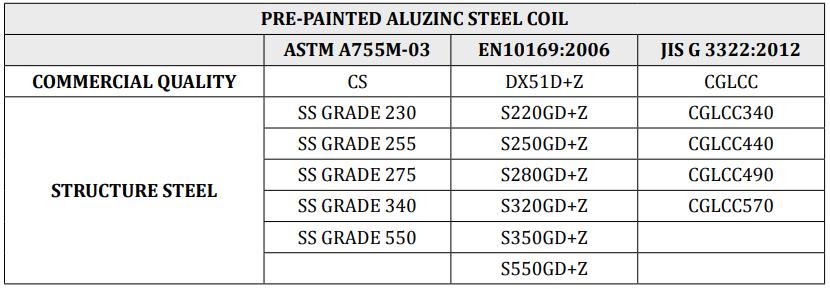
PAINT PROPERTY

APPLICATION
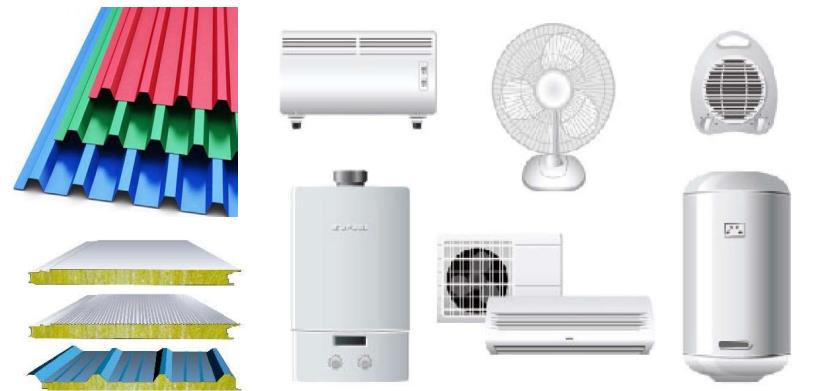
- Q:Aluminum alloy rolling doors and color steel shutter door that good
- The material and structure design Aluminum Alloy rolling shutter door out of the ordinary, can effectively prevent glare and ultraviolet radiation, sunlight greenhouse effect on indoor has completely solved, applicable to all kinds of changes in climate and weather, has a long-term protective effect on indoor environment, tests show that the shutter doors and windows to keep out sunshine rate to 100%, the the rate can reach more than 95% block temperature.
- Q:How are steel coils used in the production of agricultural systems?
- Steel coils are often used in the production of agricultural systems due to their durability and strength. These coils are typically used in the construction of machinery and equipment that are essential in agricultural operations. One common application of steel coils is in the manufacturing of farming machinery such as tractors, plows, and cultivators. These machines require sturdy components to withstand the demanding conditions of the agricultural environment. Steel coils are used to fabricate the frames, chassis, and other structural parts of these machines, providing the necessary strength and support. Steel coils are also used in the production of irrigation systems, which are crucial for efficient water management in agriculture. These coils are utilized in the construction of pipes, valves, and fittings, ensuring the durability and longevity of the irrigation system. Additionally, steel coils are used to manufacture storage tanks and silos, which are essential for storing and preserving agricultural products such as grains, seeds, and fertilizers. Furthermore, steel coils find application in the construction of greenhouses and agricultural buildings. The coils are used to fabricate the structural framework, providing stability and resistance against environmental factors. Steel coils are also used in the production of fencing and enclosures to protect crops and livestock from external threats. In summary, steel coils play a vital role in the production of agricultural systems by providing the necessary strength, durability, and stability required for farming machinery, irrigation systems, storage facilities, and agricultural structures. Their usage ensures that these systems can withstand the demanding conditions of the agricultural industry and contribute to efficient and sustainable farming practices.
- Q:How are steel coils protected against fire and heat?
- Steel coils are typically protected against fire and heat through various methods such as fire-resistant coatings, fire blankets, water-based sprays, or the use of fire-resistant barriers or walls in the storage area. Additionally, fire detection and suppression systems, such as sprinkler systems, are often installed to quickly extinguish any potential fire.
- Q:How is the quality of steel coils determined?
- The quality of steel coils is determined through various tests and inspections, including visual examination, dimensional inspection, mechanical properties testing, and chemical analysis. These assessments help identify defects, such as surface imperfections, cracks, or variations in thickness and width, as well as ensure the desired mechanical properties and chemical composition of the steel.
- Q:What is the yield strength of steel coils?
- The yield strength of steel coils can vary depending on the specific grade and composition of the steel. However, on average, the yield strength of steel coils typically ranges from 250 to 350 megapascals (MPa).
- Q:My uncle got me some new 'Nam style jungle boots at the px at Fort Worth JSB, and he told me that back in Vietnam, they used to issue guys steel sole boots, that had a sole reinforced with a steel plate, as punji stick d-fence. Is this true, it sounds logical, but I can't figure out how a steel plate in the sole would work. My uncle is kind of a BS'er, plus he wasn't even in Vietnam, much less the Infantry, much less combat, but he was in USAF at the time.
- This Site Might Help You. RE: Steel sole combat boots? My uncle got me some new 'Nam style jungle boots at the px at Fort Worth JSB, and he told me that back in Vietnam, they used to issue guys steel sole boots, that had a sole reinforced with a steel plate, as punji stick d-fence. Is this true, it sounds logical, but I can't figure out how a...
- Q:Can steel coils be coated with polymer?
- Yes, steel coils can be coated with polymer.
- Q:What are the different types of steel coil slitting lines?
- There are several different types of steel coil slitting lines that are used in the metal processing industry. These lines are designed to cut large coils of steel into narrower strips, which can then be used for various applications. 1. Loop Slitting Lines: Loop slitting lines are the most common type of slitting line used in the industry. They consist of a decoiler, which holds the coil, a slitter head that cuts the coil into strips, and a recoiler, which winds the strips back into smaller coils. Loop slitting lines are versatile and can handle a wide range of coil widths and thicknesses. 2. Scrap Chopper Slitting Lines: Scrap chopper slitting lines are similar to loop slitting lines but include a scrap chopper unit. This unit cuts any excess material from the edges of the coil before it is slit into strips. This helps to improve the efficiency of the slitting process and reduces waste. 3. Double Loop Slitting Lines: Double loop slitting lines are used for high-speed slitting of thin-gauge coils. They feature two looping pits, which allow for continuous operation. While one coil is being processed, the other is being prepared for slitting, ensuring minimal downtime. 4. Turret Head Slitting Lines: Turret head slitting lines are designed for high-volume production and can process multiple coils simultaneously. They feature a turret head with multiple slitter knives, which can be quickly rotated to switch between different coil widths. This allows for faster and more efficient production. 5. Rotary Shear Slitting Lines: Rotary shear slitting lines are used for thicker and harder materials. They use a rotary shear instead of a slitter head to cut the coil into strips. The rotary shear offers better cutting performance and can handle higher tensile strength materials. 6. Combination Slitting Lines: Combination slitting lines are versatile machines that can handle a range of materials and can perform both slitting and cut-to-length operations. These lines are ideal for smaller manufacturers or those who require flexibility in their production process. Overall, the type of steel coil slitting line used will depend on the specific requirements of the manufacturer, including the type of material being processed, the desired strip width, and the volume of production.
- Q:What are the different types of steel coil slitting machines?
- There are several different types of steel coil slitting machines, including manual slitters, semi-automatic slitters, and fully automatic slitters. Manual slitters require manual adjustment and operation, while semi-automatic slitters have some automated features but still require some manual intervention. Fully automatic slitters are the most advanced type, with fully automated controls and high-speed operation.
- Q:How are steel coils tested for quality?
- Steel coils are tested for quality through a variety of methods, including visual inspections, measurements of dimension and weight, and mechanical tests such as tensile strength and hardness. Additionally, non-destructive testing techniques like ultrasonic or magnetic particle testing may be used to detect any potential defects or flaws within the coils. These comprehensive testing procedures ensure that the steel coils meet the required quality standards before they are used in various industries.
1. Manufacturer Overview |
|
|---|---|
| Location | |
| Year Established | |
| Annual Output Value | |
| Main Markets | |
| Company Certifications | |
2. Manufacturer Certificates |
|
|---|---|
| a) Certification Name | |
| Range | |
| Reference | |
| Validity Period | |
3. Manufacturer Capability |
|
|---|---|
| a)Trade Capacity | |
| Nearest Port | |
| Export Percentage | |
| No.of Employees in Trade Department | |
| Language Spoken: | |
| b)Factory Information | |
| Factory Size: | |
| No. of Production Lines | |
| Contract Manufacturing | |
| Product Price Range | |
Send your message to us
Color Coated Alu-zinc Steel Coil PPGP PRE-PAINTED Aluzinc
- Loading Port:
- Shanghai
- Payment Terms:
- TT or LC
- Min Order Qty:
- 20 m.t.
- Supply Capability:
- 10000 m.t./month
OKorder Service Pledge
Quality Product, Order Online Tracking, Timely Delivery
OKorder Financial Service
Credit Rating, Credit Services, Credit Purchasing
Similar products
New products
Hot products
Hot Searches
Related keywords
